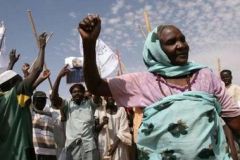Aspirations of Darfur civilians far from mediators’ agenda
By Opheera McDoom
October 28, 2007 (EL-FASHER) — Sitting around a dusty courtyard trying to shade from the punishing sun, survivors of Darfur’s 4-1/2-year-old conflict discuss lofty political ambitions and dreams for their uncertain future.
 The more than 2 million Darfuris who sought refuge in makeshift camps — one third of the region’s population — reject the peace talks in Sirte, Libya, which opened on Saturday despite a boycott by the key rebel factions.
The more than 2 million Darfuris who sought refuge in makeshift camps — one third of the region’s population — reject the peace talks in Sirte, Libya, which opened on Saturday despite a boycott by the key rebel factions.
The boycott leaves little hope negotiators will achieve anything of substance.
But even if those rebels who are supported by the population went to the talks, the goals demanded by their increasingly politicised people would be a far cry from the agenda prepared by African Union and United Nations mediators.
Separating religion from state in Sudan, which operates under Islamic sharia law, having democratic elections to change the government, and a referendum on possible Darfur secession are the issues these victims want addressed.
“We want another government,” said Ibrahim Musa Abakr, 37, who fled the war to the Abu Shouk camp near Darfur’s main town el-Fasher.
“Any deal this government has signed is just on paper. They are not serious,” he added.
International experts estimate some 200,000 have died and 2.5 million driven from their homes after mostly non-Arab rebels took up arms accusing central government of neglect.
Darfur’s rebels have the same complaints as insurgents in Sudan’s south and other regions, that central Nilotic tribes around Khartoum have dominated power since independence in 1956.
Abakr said the government had exploited Islam for it own ends — to remain in power — and he wanted a secular state.
“THIS IS NOT ISLAM”
“When they attacked us they (government forces) came inside the mosque and killed people — this is not Islam,” he said.
“People here are simple and believe only in Islam. So when the government tells them to fight for Islam, they believe them,” he added. “They exploit the religion.”
Abakr’s comments sparked fierce debate at the camp, but only one man, al-Amin Ismail, said he did not want a secular state.
“Any laws, secular, religious, if they are agreed on by all and used properly, can work,” he said. “The problem is this government take their own laws and call it Islam.
“If we have a constitution agreed on by all the people in Sudan and adhered to by government, then it can work.”
Those who have lived in the miserable camps for four years have plenty of time for discussions under the hot Sudanese sun.
But those who claim to represent them at the negotiating table will be battling over much more limited issues.
The government has refused to reopen a May 2006 peace deal signed by only one of three rebel negotiating factions, leaving little diplomatic space to increase compensation for war victims or address wealth and power sharing as rebels want from a new or updated accord.
In earlier talks, rebels dropped the idea of a secular state but, ahead of renewed negotiations, the idea of a separate autonomous Darfur region was proposed once again by insurgents.
“Why should I want a government that attacked me, killed my people?” said teacher Fatma Adam Yagoub. “Only the foreigners and our brothers and sisters in el-Fasher helped us.”
PILES OF CLOTHES
Yagoub’s 17-year-old niece was abducted along with other students from the girl’s school in her town Tawila by militias she said the government armed, supported and supplied.
The only remnants of the girls were piles of their clothes, scattered all over the classroom floor.
“It looked like they’d been raped in there — there was evidence of a scuffle,” she said. “They were all taken — many of them — and we never saw them again.”
The camps, where most people live in wooden and straw shacks, covered by plastic sheets bearing U.N. logos, get more politicised the longer those suffering remain there.
But despite their lack of work and desire to go back to their farms where they can grow their own food rather than dependent on handouts from foreign aid agencies, they all vow to vote in democratic elections due by the end of 2009.
“This government is not my government – it’s a dictatorship, a totalitarian rule. I want to have our own government which we choose and represents us,” Yagoub said.
“As we say here — the crow won’t peck out its own eyes.”
(Reuters)
